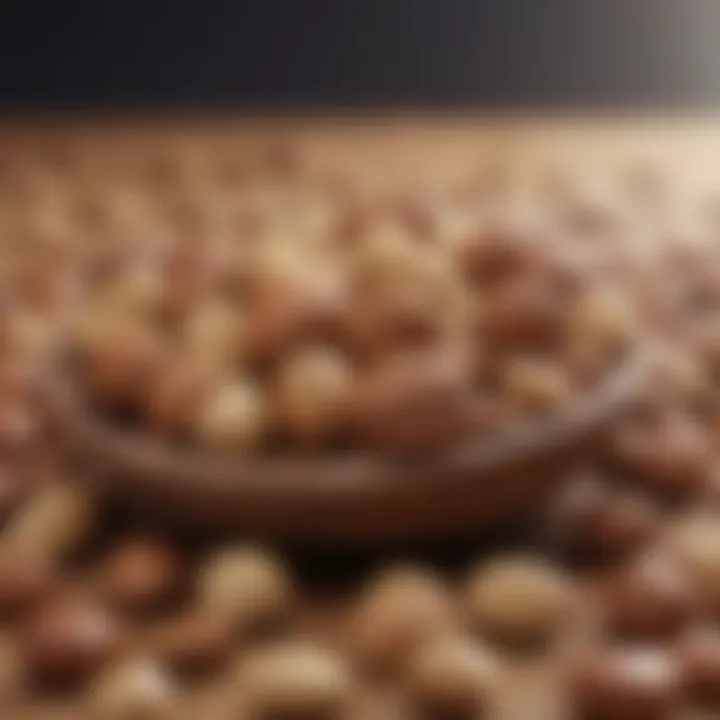Top Foods to Combat Bad Breath Naturally


Intro
Bad breath, scientifically known as halitosis, can affect many individuals, influencing both personal confidence and social interactions. Several factors contribute to this condition, such as inadequate oral hygiene, specific food choices, and underlying health concerns. Understanding how food impacts oral health is vital in managing and diminishing bad breath. Nutrition can play an essential role not only in freshening the mouth but also in promoting overall wellness.
In this article, we will explore the relationship between diet and bad breath. We will discuss which foods might contribute to unpleasant odors and highlight those that can mitigate them. By focusing on specific nutrients and dietary habits, it is possible to cultivate better oral health and enhance freshness.
The discussion also extends to lifestyle choices, as these can influence how effectively one combats halitosis. Through a deeper examination of various foods and their effects on oral health, this article aims to provide substantial insights into effective management strategies for bad breath.
Understanding Bad Breath
Bad breath, medically known as halitosis, is an issue that affects a significant number of people. It can have social, mental, and physical repercussions. Understanding the nature of bad breath is essential for anyone aiming for personal improvement and social interactions. The implications of halitosis go beyond unpleasant odors; they can influence an individual’s confidence and well-being. Addressing this problem requires insight into its underlying causes, including habits or conditions that contribute to oral health deficiencies.
Defining Halitosis
Halitosis is defined as a condition where an individual has chronic bad breath. This is not just a fleeting issue; halitosis can persist intermittently or continuously. The severity of bad breath can vary, from barely noticeable to extremely potent. Determining whether someone suffers from halitosis often involves self-assessment as well as feedback from friends and family who might be hesitant to discuss the topic. Understanding this condition is crucial because it can lead to several other consequences, including avoidance of social situations or diminished self-esteem.
Common Causes
Common causes of halitosis can be broadly categorized into three main areas: poor oral hygiene, dietary factors, and health conditions. Understanding these causes plays a pivotal role in devising plans to manage and combat bad breath effectively.
Poor Oral Hygiene
Poor oral hygiene is one of the most prevalent causes of bad breath. When an individual neglects to clean their teeth, tongue, and gums properly, food particles can linger, leading to bacterial growth. This results in odor-producing compounds. The key characteristic of poor oral hygiene is the inability to maintain a routine of brushing and flossing. It is vital to recognize that good oral hygiene is a beneficial approach in combatting bad breath. Maintaining a clean oral environment helps minimize the bacterial load, thus reducing the unpleasant odors. The unique feature of proper oral hygiene practices is their immediate effect; consistent brushing and flossing can lead to fresh breath in a short period.
Dietary Factors
Dietary factors contribute significantly to the development of halitosis. Certain foods, such as garlic and onions, are notorious for causing bad breath due to their strong aroma and sulfurous compounds. Individual food choices can amplify the symptoms of bad breath. The key characteristic of dietary factors lies in the direct correlation between what a person eats and their breath's smell. This information is beneficial for crafting dietary strategies aimed at mitigating halitosis. Unique features of dietary contributions to bad breath include the lasting effects of specific foods; for instance, the odors can persist long after consumption. Understanding these factors empowers individuals to make informed dietary choices.
Health Conditions
Various health conditions can also lead to bad breath. Conditions like sinus infections, diabetes, and gastrointestinal issues may produce distinct odors. The key characteristic of health conditions causing halitosis is the underlying pathology that results in microorganisms or metabolic by-products contributing to oral odors. Recognizing such health conditions is beneficial because it highlights the importance of comprehensive health management. The unique feature here is that bad breath may serve as a warning sign for more serious health issues, prompting individuals to seek medical consultation. It emphasizes the interconnectedness of oral health and overall health for effective prevention strategies.
How Diet Impacts Oral Health
Diet plays a crucial role in determining not only overall health but also oral health, significantly affecting factors like bad breath. Healthy eating habits contribute to fresher breath and improved oral hygiene. Certain foods help eliminate bacteria that cause bad odors, while other dietary choices can exacerbate the problem. Understanding how diet impacts oral health can lead to better personal choices that may mitigate issues like halitosis.
Connection Between Food and Breath
The food we consume interacts with our bodily functions, including those that relate to oral health. When we eat, food particles can become trapped in the mouth, providing a breeding ground for bacteria. These bacteria produce sulfur compounds that are primarily responsible for bad breath.
Eating fresh fruits and vegetables increases saliva production. Saliva has natural antibacterial properties that help wash away food particles and bacteria. Examples include crunchy foods like apples and carrots. Their texture helps scrub the teeth and reduce plaque build-up, which ultimately can lead to fresher breath.
Moreover, some foods contain compounds that neutralize odors. For instance, raw parsley and mint not only add flavor to dishes but also contribute to fresher breath. They are rich in chlorophyll, which has deodorizing properties. Regular inclusion of these foods in your diet, alongside proper oral hygiene, can be effective in combating unpleasant smells.
The Role of Hydration
Hydration is often overlooked when considering the factors affecting breath freshness. Water plays a vital role in oral health, and adequate hydration is necessary for optimal saliva production. Saliva is an essential element in maintaining oral hygiene, as it helps cleanse the mouth and remove food debris.
When individuals are dehydrated, this can lead to dry mouth, which provides an ideal environment for bacteria to thrive. Increasing water intake can keep the mouth moist, helping to flush away food particles and reduce bacteria levels. It’s advisable to sip on water throughout the day, especially after consuming meals.
Certain hydrating foods, like watermelon and cucumbers, not only quench thirst but also contribute to oral hydration. Incorporating these foods into your diet can support hydration levels and contribute to overall breath freshness. Ultimately, being mindful of food and hydration choices helps maintain oral health, making it imperative to consider these aspects in daily life.
Foods That Combat Bad Breath
Understanding what we eat is essential to manage bad breath effectively. The foods we choose can have a direct effect on oral health, influencing the presence of odor-causing bacteria. Certain foods can help neutralize unpleasant smells and contribute to a fresher breath. Additionally, selecting the right kinds of food often promotes overall wellness, making it a beneficial approach for anyone concerned about halitosis.
Fruits and Vegetables
Fruits and vegetables are key players in combating bad breath. They are generally high in water content, nutrients, and fiber. These components work together to keep the mouth hydrated and stimulate saliva production, which is nature's way of washing away food particles and bacteria. Let's examine a few of these food items in more detail.


Apples
Apples are often regarded as a superfood for breath freshness. Their high fiber content acts like a natural toothbrush, scrubbing away plaque and food residues stuck on teeth. The act of chewing apples also stimulates saliva production, which helps maintain a neutral pH in the mouth.
Moreover, apples contain antioxidants. These substances can mitigate inflammation in the gums, further helping with oral hygiene. The downside is that not all varieties have the same level of acidity and sweetness, which can differ based on the exact type of apple.
Carrots
Carrots are another excellent choice for oral care. Crunching on a fresh carrot increases saliva flow, which can help wash away bacteria responsible for bad breath. Carrots are low in calories and can also bring various vitamins and minerals to your diet.
However, the texture can be a little abrasive for some people, especially if they have existing dental issues. This can be less than ideal for individuals with sensitive teeth, but, for most, they remain an effective natural remedy.
Cucumbers
Cucumbers are primarily made of water, aiding hydration in the body, which is crucial for fresh breath. They can be particularly refreshing and easy to eat as a snack or in salads. Cucumbers have a unique property of producing phytonutrients that can potentially eliminate bacteria in the mouth.
Their soft nature generally makes them easy to chew. However, some may find them less filling, so they may not serve as a complete snack alone. Yet, combining them with other foods can create a more balanced option.
Herbs and Spices
Incorporating herbs and spices can also help in battling bad breath. These natural ingredients provide various health benefits and can be fundamental in freshening your breath. The potency of their flavors can overshadow unpleasant odors quite effectively.
Parsley
Parsley has been recognized for its freshness and vibrant green color. It contains chlorophyll, which is thought to neutralize odors. Chewing on parsley after meals can help clear out lingering smells from garlic or onions.
Moreover, it is a nutrient-rich herb that provides vitamins such as K and C. However, those who dislike the taste of parsley might need to seek alternatives for breath control.
Mint
Mint is perhaps the most well-known herb for fresh breath. Its strong flavor actively masks unpleasant odors and offers a cooling sensation. This is why mint is very common in various mouthwashes and chewing gums.
While mint can be quite effective, its usage might not be suitable for everyone. Some may experience stomach problems when consuming too much. Moderation and balance should always be considered.
Cinnamon
Cinnamon has antimicrobial properties that can help fight against oral bacteria. Using cinnamon in cooking or consuming it can freshen your breath effectively. For those who enjoy its flavor, it's a delightful addition to various dishes.
However, cinnamon can be overpowering, and excessive use might lead to some adverse effects. Being cautious about the quantity can ensure that one benefits from its positive qualities without experiencing negatives.
Dairy Products
Dairy products have a place in the conversation about fresh breath, as many of them are beneficial to oral health due to their content. While some may assume that dairy could cause bad breath, it can actually combat it effectively when consumed in moderation.
Yogurt
Yogurt contains probiotics, which can promote a healthy balance of bacteria in the mouth and gut. This balance plays a significant role in preventing the buildup of odor-causing bacteria. Additionally, yogurt usually has a creamy texture that is enjoyable to eat and can offer other nutritional benefits.
For some, the sugar content in flavored yogurts may outweigh these benefits. Choosing plain, unsweetened options is generally advised for better results.
Cheese
Cheese, like yogurt, has positive effects on oral health. It contains calcium and protein and can stimulate saliva production. Some studies suggest that cheese can raise oral pH levels, effectively combating harmful acids in the mouth.
However, processed cheeses may not provide the same benefits. Natural cheese is often the preferable choice, so selecting types like cheddar or mozzarella is recommended for their better nutritional profile.
Hydrating Foods
Hydrating foods play a vital role in maintaining fresh breath. Foods with high water content help keep the mouth moist, wash away debris, and reduce dry mouth, a common contributor to bad breath.


Watermelon
Watermelon is an excellent source of hydration, making it a top choice for a snack. The juicy consistency aids in keeping the mouth clean. It is enjoyable to eat and also provides vitamins and minerals beneficial for overall health.
However, while watermelon is nutritious and refreshing, it may not have a long-lasting effect in combating bad breath, especially if eaten alone. Pairing it with fibrous foods can maximize breath-cleaning benefits.
Oranges
Oranges are not only refreshing but also rich in vitamin C. This vitamin can enhance oral health by keeping gums healthy and by helping in producing saliva, which is essential for cleaning the mouth. They have a zesty flavor which many people enjoy.
On the downside, the acidity can be irritating for some, especially those with acid reflux issues. Choosing them should depend on individual tolerance levels.
Beverages That Help Freshen Breath
Beverages play an essential role in maintaining oral health. They can actively contribute to freshening breath and combating halitosis. Certain drinks not only hydrate but also possess properties that neutralize bad odors and promote better oral hygiene. When it comes to your daily routine, being mindful of your beverage choices can make a significant difference in your oral freshness.
Green Tea
Green tea is often regarded for its numerous health benefits, and its impact on breath is particularly noteworthy. This beverage contains polyphenols which can disrupt the growth of bacteria that cause bad breath. Additionally, green tea can help in reducing inflammation in the gums, promoting a healthier mouth overall.
To get the best results, consider drinking unsweetened green tea. Adding sugar or sweeteners may counteract its beneficial effects. In fact, unsweetened options help maintain a suitable balance in oral bacteria. You may enjoy a cup after meals as part of your regular routine.
Water
Water stands out as the most fundamental beverage for oral health. Staying hydrated is key. A dry mouth can lead to worsened breath as saliva production decreases. Saliva plays a vital role in naturally washing away food particles and bacteria from the mouth. Therefore, drinking sufficient water throughout the day can help keep your mouth moist.
It's best to sip water consistently rather than consuming large amounts all at once. Carrying a water bottle can serve as a reminder to stay hydrated. Additionally, consider rinsing your mouth with water after meals to mitigate any immediate odor issues that may arise from food consumption.
Diluted Apple Cider Vinegar
Diluted apple cider vinegar is another option worth considering. It has been known for its acidic properties, which can help neutralize odors in the mouth. While the direct impact on breath may not be immediately noticeable, its role in improving digestion can indirectly affect breath quality.
To use apple cider vinegar for this purpose, mix one or two tablespoons with a cup of water and drink it before meals. This mixture is also thought to have potential health benefits such as improved digestion. However, it's important to keep in mind that the acidity may erode tooth enamel over time, so moderation is crucial. Refrain from using it excessively.
Always consult with a dental professional before making significant changes to your oral care routine.
In summary, selecting the right beverages can significantly contribute to managing bad breath. Incorporating choices like green tea, water, and diluted apple cider vinegar can aid in maintaining freshness and improving overall oral health.
Foods to Avoid
In the discussion of bad breath, recognizing what to limit is as essential as knowing what to include. Certain foods can contribute to halitosis by promoting an imbalance in oral flora or leaving behind strong odors. Understanding which foods to avoid will assist in maintaining better breath and overall oral health. Here are crucial categories to consider:
Sugary Foods
Sugary foods contribute significantly to bad breath. When sugar enters the mouth, it provides a feast for bacteria. These microorganisms produce sulfur compounds as they metabolize sugar, leading to unpleasant odors. Furthermore, sugary snacks often stick to teeth, creating a breeding ground for these bacteria.
- Avoid candies, particularly hard ones, that linger in the mouth.
- Limit desserts with high sugar content.
Choosing sugar-free alternatives can be beneficial. Products featuring xylitol, for example, can help reduce bacterial growth. Therefore, it is wise to limit sugary foods for fresher breath.
Garlic and Onions
Garlic and onions are staples in many cuisines, yet both can cause persistent bad breath. The compounds responsible for their distinct flavors, like allicin in garlic and sulfur compounds in onions, can linger in the mouth long after they are consumed. They are absorbed into the bloodstream and expelled from the lungs, causing breath to smell for hours or even days. To combat this, consider the following:
- If consuming these foods, pair them with fresh parsley or mint.
- Maintain good oral hygiene by brushing and rinsing afterward, as this can help reduce their effects.
Caffeinated Beverages
Caffeine is not only a stimulant but also a diuretic, which can lead to dehydration. A dry mouth reduces saliva production, which is essential for washing away food particles and bacteria. Less saliva means an increased risk of bad breath. Specific points to consider include:


- Limit coffee and energy drinks, particularly in excess.
- Opt for hydrating alternatives, like herbal tea or water, to maintain optimal moisture in the mouth.
In summary, avoiding these foods can greatly contribute to combating bad breath. This aligns with a holistic approach to oral health, making it easier to stay fresh and confident.
By carefully selecting what foods to include in your diet and minimizing those that contribute to bad breath, you can make a significant impact on your oral health.
Best Practices for Oral Hygiene
Maintaining good oral hygiene is essential not just for fresh breath but also for overall health. Practices that promote oral cleanliness greatly reduce the presence of bacteria in the mouth and can prevent the unpleasant odors associated with halitosis. A clean environment in the mouth leads to healthier teeth and gums, and a noticeable improvement in breath.
By paying attention to proper oral hygiene, one can ensure that their efforts to combat bad breath are effective. This involves more than just brushing; it encompasses a complete approach to oral care.
Brushing Techniques
Brushing is the foundation of oral hygiene. To achieve maximum benefits, follow these guidelines:
- Use a Soft-Bristled Toothbrush: A soft brush helps prevent gum irritation and properly cleans teeth.
- Choose Fluoride Toothpaste: Fluoride strengthens tooth enamel and helps to prevent cavities.
- Brush Twice a Day: This habit prevents plaque build-up. Evening brushing is key, as it removes food particles and plaque from the day.
- Focus on Technique: Spend at least two minutes brushing, using gentle circular motions. Pay close attention to the gum line and the back of the teeth, where bacteria often thrive.
- Replace Your Toothbrush Regularly: A worn brush is less effective. Replace it every three to four months, or sooner if the bristles are frayed.
Proper brushing techniques are crucial for eliminating bad breath.
Flossing and Mouthwash
Flossing and the use of mouthwash complement brushing and enhance oral hygiene. Here's why they are beneficial:
- Floss Daily: Flossing removes food particles and plaque from between teeth, areas where a toothbrush may not reach. This step is essential in maintaining fresh breath.
- Choose the Right Floss: Pick a type that is comfortable for you, whether waxed or unwaxed. The right choice encourages consistent use.
- Mouthwash as a Final Step: Using an antibacterial mouthwash can reduce bacteria in the mouth, providing an extra layer of protection against bad breath.
- Select Alcohol-Free Products: Alcohol-based mouthwashes may dry out the mouth, leading to potential bad breath. Opt for those that contain antimicrobial agents instead.
Incorporating proper brushing techniques alongside flossing and mouthwash contributes significantly to mitigating bad breath. These practices work together to maintain a healthy oral environment, vital for anyone seeking to improve their breath and overall oral health.
When to Seek Professional Help
Understanding when to consult a professional for bad breath is crucial for long-term oral health. While changing diet and practicing good hygiene can be effective, persistent issues may indicate underlying problems that require expert assessment.
Persistent Halitosis
Persistent halitosis is more than just an occasional issue. If bad breath continues despite proper oral care—like brushing twice daily, flossing, and using mouthwash—it's time to seek help. Often, the cause may not be immediately linked to diet or hygiene. It could stem from dental problems, such as cavities and gum disease, or systemic conditions like sinus infections or diabetes. A dental professional can conduct a thorough examination and potentially identify issues that an individual may not notice. Addressing these dental concerns could lead to better overall breath quality and health.
Underlying Health Issues
In some cases, bad breath can be a sign of underlying health issues that go beyond oral health. Conditions such as respiratory infections, gastrointestinal problems, or even metabolic disorders can contribute to persistent halitosis. Some patients might overlook these symptoms, thinking that a change in diet or a new toothpaste will suffice. However, if bad breath is constant and does not improve, it is essential to consult a healthcare provider. They may conduct tests to determine if there is an underlying health issue needing attention.
"Halitosis can sometimes be a window into more serious health concerns, requiring prompt evaluation to address both the symptom and its root cause."
Recognizing the need for professional intervention can lead to effective solutions. Balancing self-care with appropriate medical guidance can significantly improve oral health and well-being.
Closure
The significance of diet in managing bad breath cannot be understated. This article has elaborated on various dietary approaches that play a crucial role in combating halitosis. While many factors contribute to bad breath, integrating the right foods into daily meals can provide an effective solution. Eating fruits like apples and vegetables such as carrots helps promote saliva production. This helps wash away food particles and bacteria that cause unpleasant odors. Incorporating herbs like parsley and mint safeguard oral freshness, while yogurt contributes beneficial bacteria which can improve gut health and breath quality.
The benefits of understanding dietary approaches to oral health are plentiful. These choices not only target bad breath but also contribute to overall well-being. Avoiding sugary snacks and reducing the intake of garlic and onions can foster a more pleasant oral environment. Staying hydrated is another valuable practice. Regular consumption of water and hydrating foods like watermelon can mitigate dryness and enhance breath freshness. These practical steps lead to long-term oral health benefits that are easy to adopt.
Recap of Dietary Approaches
In summary, this article highlights various dietary choices that can effectively combat bad breath. Key points include:
- Fruits and Vegetables: Eating fresh produce like apples and carrots helps maintain saliva flow.
- Herbs and Spices: Parsley, mint, and cinnamon provide natural freshness and reduce odor-producing bacteria.
- Dairy Products: Yogurt can support healthy gut bacteria, leading to improved breath.
- Hydration: Consuming water and hydrating foods such as oranges enhances saliva production, reducing dry mouth.
When it comes to beverages, options like green tea and diluted apple cider vinegar can additionally contribute to oral freshness. These dietary elements combine to create a holistic approach to managing bad breath.
Emphasizing Comprehensive Care
While dietary factors are pivotal, they are part of a broader strategy for optimal oral health. Regular dental visits, proper brushing techniques, and consistent flossing practices are essential for maintaining fresh breath and overall mouth health.
Implementing a comprehensive care routine combines diet, hydration, and hygiene practices. Regularly consulting with a healthcare professional can also help address any underlying health issues that might contribute to persistent bad breath. It is important to appreciate the role of diet as not just a remedy for halitosis but as part of a lifestyle that seeks to enhance overall health. This insight encourages individuals to take proactive steps towards improving their oral health and, by extension, their quality of life.
"Incorporating healthy dietary habits holistically influences breath freshness and overall wellness."
By providing a balanced focus on dietary approaches and comprehensive care, individuals can significantly improve their experiences with oral health and reduce the occurrence of bad breath.



